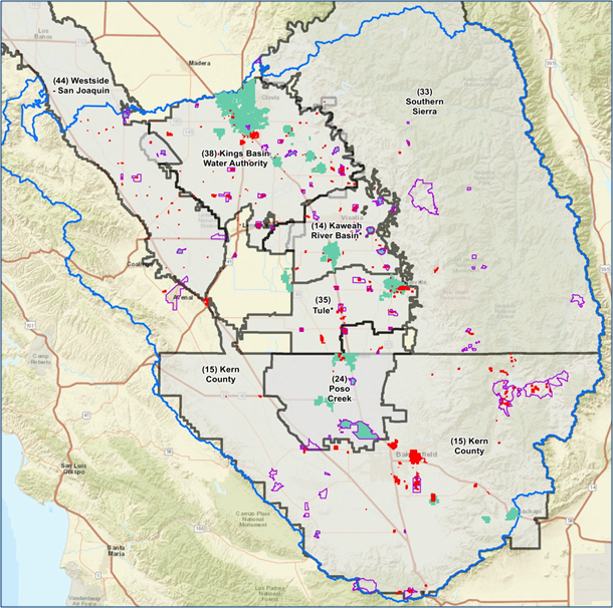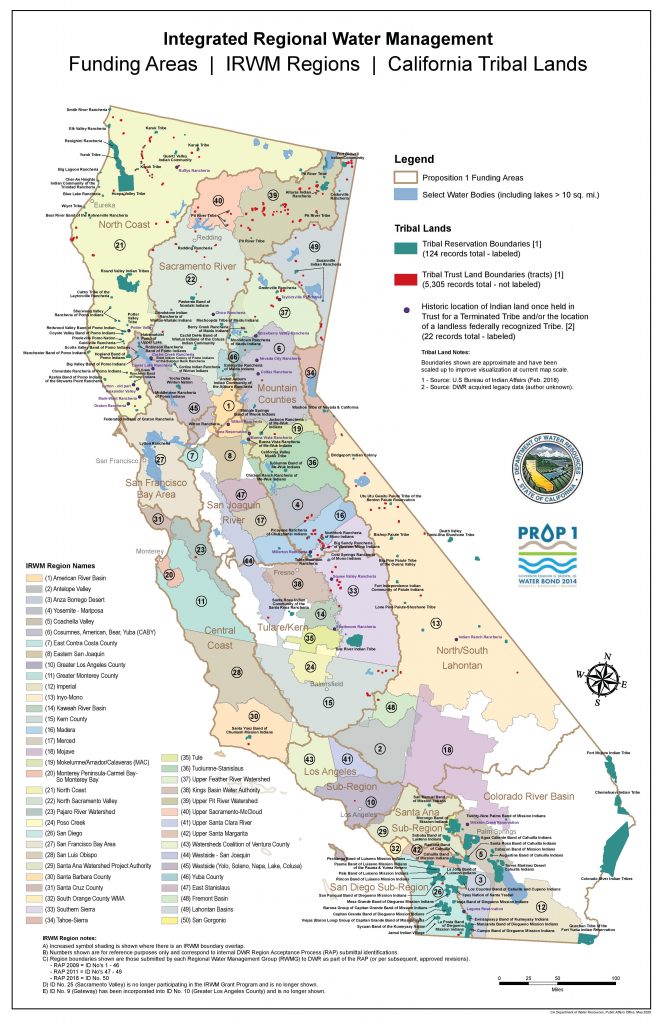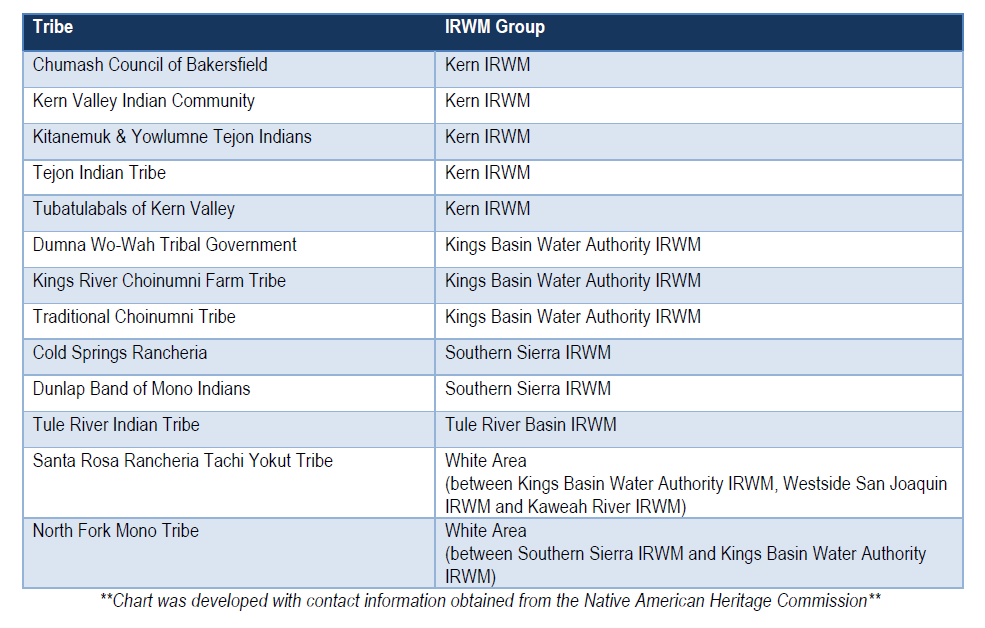Tulare-Kern Funding Area Disadvantaged Community Involvement Program
 The Tulare-Kern Funding Area encompasses most of Fresno, Kern, Kings and Tulare Counties.
The Tulare-Kern Funding Area encompasses most of Fresno, Kern, Kings and Tulare Counties.
The Tulare-Kern Funding Area Disadvantaged Community Involvement Program (TKFA DACIP) is a $3.4 million one-time grant-funded effort aimed at improving the involvement of Disadvantaged Communities (DACs) in Integrated Regional Water Management (IRWM) planning. All seven IRWM groups within the Tulare-Kern Funding Area have chosen to participate in the DACI Program.
The seven IRWM groups participating in the TKFA are:
- Kaweah River Basin IRWM
- Kern County IRWM
- Kings Basin Water Authority
- Poso Creek IRWM
- Southern Sierra Regional Water Management Group
- Tule River Basin IRWM
- Westside-San Joaquin IRWM
Program Activities
The TKFA DACI Program includes the following activities:
- Needs Assessment of all Communities in the TKFA: Evaluation of the community characteristics, drinking water, wastewater, storm water and other water related needs.
- Project Development Assistance: Engineering, environmental documents, application preparation and more to help communities develop shovel-ready projects that will be competitive for planning or construction funding. List of projects approved for project development funds for the TKFA are listed here.
- DAC Engagement and Education Program: Community meetings, training workshops and educational tours/field trips. Detailed information about the DACEEP is provided below.
- Program Administration and Reporting: Project management, grant administration, and final report.
Download the Disadvantaged Community Involvement Program (DACIP) Informational Sheet.
DAC Engagement and Education Program
Self-Help Enterprises is responsible for implementing the Disadvantaged Community Education and Engagement Program (DACEEP). The DACEEP focuses on improving understanding of community water needs and the IRWM process as well as encouraging DAC participation and engagement in IRWM activities.
Activities under the DACEEP include:
- Assessment of Past and Present DAC Engagement
- Community Water Needs Assessment
- Community Outreach & Education
- Project Identification, Development and Funding Requests
- Developing Recommendations for Communities Not Covered by an IRWM Region
- Facilitate Community Participation at DWR Pre-Funding Application Workshops
- Coordination with Project Advisory Committee
- Program Administration
- Developing Individual Recommendations for IRWM Groups
- Other Activities identified by DACs, IRWM groups as approved by the PAC
For questions or assistance, contact: Sonia Sanchez, Senior Community Development Specialist at SoniaS@selfhelpenterprises.org or (559) 802-1689.
How to Get Involved in IRWM
There are several ways to get involved:
- Identify your local IRWM Group: See the Get to Know Your IRWM Factsheets below to locate which IRWM your community belongs to or use the DAC Mapping Tool and select the “Proposition 1 Funding Areas” layer.
- Obtain More Information. Visit your group’s website as it will contain significant information and updates.
- Sign up to Get Updates. Contact your IRWM to be added to the interested parties list. You will receive information about upcoming public meetings.
- Attend Public Meetings. Public meetings are opportunities to share your thoughts on common water needs, provide input, and ask questions.
- Join an Advisory Committee. Some IRWMs form Advisory Committees to assist the Governing Board with the IRWM program development and implementation.
- Join your Group and/or Adopt the IRWM Plan. Contact your IRWM to inquire how you can join the group.
Click here to watch a video and learn more about how to get involved.
Get to Know Your IRWM Factsheets
- Kaweah River Basin IRWM / Get to Know Your Kaweah River Basin IRWM Factsheet
- Kern IRWM / Get to Know Your Kern IRWM Factsheet
- Kings Basin Water Authority IRWM / Get to Know Your Kings Basin Water Authority IRWM Factsheet
- Poso Creek IRWM
- Southern Sierra IRWM / Get to Know Your Southern Sierra IRWM Factsheet
- Tule River Basin IRWM / Get to Know Your Tule River Basin IRWM Factsheet
- Westside-San Joaquin IRWM / Get to Know Your Westside-San Joaquin IRWM Factsheet
Available Funds in the TKFA
DWR will release Prop 1 funding in two solicitation rounds. The first solicitation round occurred in 2019 and the second round is forthcoming. Each round will have a limited amount of funding available. Round 1 was released in 2019, where the TKFA had $11.5 million available for general implementation projects and $1.2 million available for DAC Round 1 implementation projects. All projects (DAC and non-DAC) that applied for funding in Round 1 were presented to DWR during a pre-application workshop on April 24, 2019. Final funding awards for Round 1 for the TKFA can be found here: https://bit.ly/TKFA_Round1.
The Round 2 solicitation process will begin in Summer 2021. The TKFA will have the remaining funds of $11.5 million available for general implementation projects available and $2.2 million available for DAC implementation projects. If you are interested in pursuing Round 2 funding, we encourage you to attend the Prop 1 IRWM Implementation Grant Program Round 1 Survey Results and Round 2 Concepts virtual workshop taking place May 6, 2021 from 9:30 am to 11:30 am. To register for this virtual workshop, please visit: https://attendee.gotowebinar.com/register/8704178661410600719?source=IRWM+List+Serve. If you have any questions about the webinar, please contact: California Department of Water Resources at DWR_IRWM@water.ca.gov or IRWM Roundtable of Regions at: jodie@jmconsultants.net.
Eligible Projects & Priorities
Projects can include, but are not limited to, groundwater storage, improvement of water quality, sanitary systems, water conservation, and storm water resources management.
Priority will be given to projects that advance the IRWM goals: enhance water supply and reliability, protect or improve water quality, and those that address the Human Right to Water and climate and drought preparedness.

How to Request Funding for Projects
Participate in the IRWM program to be eligible to request funds. You can follow these steps to get started:
1. Contact your local IRWM Group
2. Understand their project submission process
3. Complete necessary forms to submit project
4. Submit and get the project on the IRWM project list
5. As funding becomes available, update your project
Click here to watch a video and learn how IRWM can help address regional water challenges.
Community Water Needs Assessment Tool
The Community Water Needs Assessment Tool (https://dacapp.tularelakebasin.com/dacstorymap/) for the Tulare-Kern Funding Area (TKFA) was developed to provide a mapping interface for users to access the data collected through the TKFA Disadvantaged Community (DAC) Needs Assessment. The tool provides various data sets in a single interface, has several tools available, and can generate reports to provide commonly needed information for users.
To learn more about the needs of DACs within the TKFA, there are five (5) tabs, which highlight and identify DACs, Water Quality, Private Well Communities, a Ranking of Community Needs, and Wastewater Facilities. Additionally, the tool includes a list of Resources. Please click for an instructional video to assist you in using the Community Water Needs Assessment Tool.
There are many potential uses for the tool, which include, but may not be limited to, the following:
- IRWM groups that want to find out more information related to the DACs in their region and the respective needs
- Counties that want to find out more information related to the DACs within the county and the respective needs
- DACs that want to find out more about IRWM, funding programs, or search information regarding their own systems
- Counties, Non-Governmental Organizations, residents or consultants that want to find out more information related to a specific community’s water-related conditions and needs
- Advocacy groups or State representatives who want to better understand needs in this area to help drive legislation and/or funding programs
The project team coordinated with local, state, and federal agencies and data sources, as well as appropriate organizations to collect existing data to create the database. The project team utilized Geographic Information Systems (GIS) to map the location of disadvantaged communities in the TKFA and other available and relevant data in order to identify needs. The Community Water Needs Assessment Tool will be maintained by the County of Tulare.
Tribal Involvement
 How Tribes are Identified in IRWM
How Tribes are Identified in IRWM
The IRWM Grant Program identifies federally recognized Indian Tribes and State Indian Tribes listed on the Native American Heritage Commission’s Tribal Consultation list, as eligible grant applicants who may access IRWM grant funding. Based on the 2019 IRWM Guidelines, a California Native American Tribe includes all Indigenous Communities of California that are on the contact list maintained by the Native American Heritage Commission. Tribes on this list include those that are federally non-recognized, federally recognized, and those with allotments lands, regardless of whether they own those lands. The map on the left displays a California Tribal Lands Map as developed and identified by DWR.
Additionally, the chart below augments DWR’s map and presents a comprehensive list of Tribes that were identified to be within the TKFA and includes their respective IRWM group based on the information provided by the Native American Heritage Commission. A white area refers to as an area that is not part of an IRWM group; however, they are still within the boundaries of the Funding Area. Although a Tribe located within a white area, depending on the IRWM group, a Tribe may request to become part of an IRWM region and have the IRWM region extend their boundaries to ensure they are eligible for grant funding.
Tribes Located within the TKFA

Eligible Projects & Priorities
Projects can include, but are not limited to, groundwater storage, improvement of water quality, sanitary systems, water conservation, and storm water resources management.
Priority will be given to projects that advance the IRWM goals: enhance water supply and reliability, protect or improve water quality, and those that address the Human Right to Water and climate and drought preparedness.
DWR will not knowingly disclose information related to Native American cultural sites or sacred places per Government Code section 6254(r). There is no requirement to disclose any information related to Native American cultural sites or sacred places to DWR in the project application.
Resources
Download the IRWM Tribal Factsheet
Download the Tribal-Funded Projects List
Download Factsheets for Tribal-Funded Projects
(Provided by the North Coast Resource Partnership)
Glossary
California Department of Water Resources (DWR) – The State agency that is tasked with administering the IRWM program.
Disadvantaged Community (DAC) – A community with an annual median household income that is less than 80 percent of the statewide annual median household income.
Funding Area – A hydrologic region, determined by the State, to which a specific amount of funding to support IRWM activities was allocated.
Groundwater – Water beneath the land surface that fills the pore spaces of sediment, soil, or rock formations.
Integrated Regional Water Management (IRWM) – A collaborative effort to manage all aspects of water resources in a region in an integrated manner.
Integrated Regional Water Management Plans (IRWMPs) – An adopted plan for a defined geographic area that describes water-related objectives and conflicts within the region, identifies disadvantaged communities, and identifies options for managing the region’s water.
Regional Water Management Group (RWMG) – Formed by joint powers agreements, memorandums of understanding or other agreements between local agencies to create regional plans to address qualified programs or projects, also known as IRWM Groups or Regions.
Stakeholders – Individuals or groups of individuals with an interest in what happens as a result of any decision or action.
Contacts
Self-Help Enterprises
Sonia Sanchez
Senior Community Development Specialist
Community Engagement and Planning
SoniaS@selfhelpenterprises.org
(559) 802-1689
IRWM Project Team
Provost & Pritchard
Consulting Group
Maija Madec
mmadec@ppeng.com
(559) 326-1100
County of Tulare/PAC
Denise England
dengland@co.tulare.ca.us
(559) 636-5027
IRWM Contacts
Kaweah River IRWM
Shane Smith
ssmith@kdwcd.com
(559) 747-5601×135
Kern IRWM
Jeff Eklund
jeklund@ppeng.com
(661) 616-5900
Kings Basin Water Authority
Soua Lee
slee@krcd.org
(559) 237-5567 x 115
Poso Creek IRWM
Sam Schafer
sschaefer@geiconsultants.com
(805) 729-4677
Southern Sierra IRWM
Bobby Kamansky
southernsierrairwmp@gmail.com
(559) 287-3311
Tule IRWM
David DeGroot
davidd@4creeks.com
(559) 802-3052
Westside San Joaquin IRWM
Scott Petersen
scott.petersen@sldmwa.org
(209) 826-9696
Educational Videos
Learn about the Integrated Regional Water Management (IRWM) Program, planning and implementation funding for a variety of projects that improve or protect water resources, and how communities can get involved.
Learn about the Integrated Regional Water Management (IRWM) Program, regional community water challenges and opportunities, and the future of the IRWM program.
